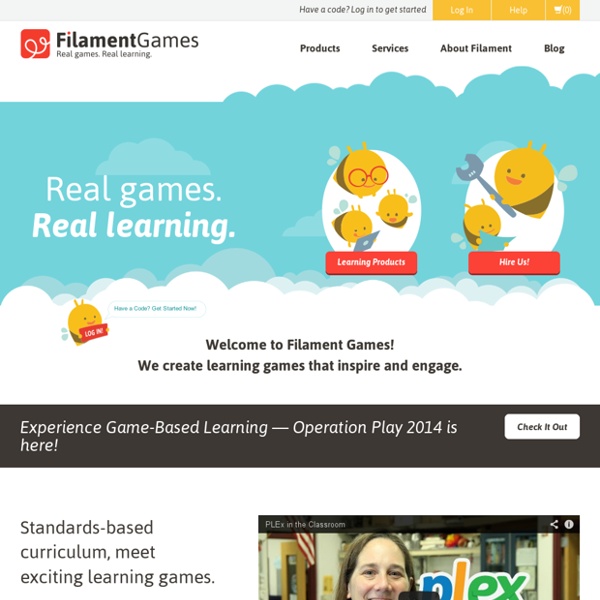



https://www.filamentgames.com/home
Related: Instructional Games, Simulations, and Virtual RealityNetLogo Models Library: BeeSmart Hive Finding NetLogo Models Library:Sample Models/Biology (back to the library) The BeeSmart Master model shows the swarm intelligence of honeybees during their hive-finding process. Fallen City: could a game help us find a solution to society's ills? The city is ruined. Bored and frustrated residents patrol the night streets, windows are smashed, buildings ransacked – there is no will or desire to fix anything or to understand its value. There is no sense of community any more… A year ago, journalist and author Jim Rossignol approached Channel 4's education department with the idea for a game – a game about broken cities. In 2008, the channel's then head of education, Janey Walker, had made the decision to switch much of the education spending from TV to online, putting aside a significant budget for the development of interactive, web-based projects with an educational remit.
15 Serious Games Aiming to Change the World Using games for purposes other than entertainment is nothing new. There are war games, educational games, throne games. But a new class of games has sprung up in recent years, designed to create awareness and raise support for a variety of global issues. Such serious games seek to harness the power of competition and/or novelty to attract players and get the word out for a good cause. Here are 15 games you can play and be a better person for it. Catalysts for Change: On April 3, 2012, Catalysts for Change went live online for 48 hours.
ecoMUVE Overview EcoMUVE is a curriculum that was developed at the Harvard Graduate School of Education that uses immersive virtual environments to teach middle school students about ecosystems and causal patterns. EcoMUVE was developed with funding from the Institute of Educational Science (IES), U.S. Department of Education. The goal of the EcoMUVE project is to help students develop a deeper understanding of ecosystems and causal patterns with a curriculum that uses Multi-User Virtual Environments (MUVEs). MUVEs are 3-D virtual worlds that have a look and feel similar to videogames. They are accessed via computers and, in our case, recreate authentic ecological settings within which students explore and collect information.
Wikis in the classroom, 2012 edition It’s been years now since I’ve written anything here, but a conversation today on the Eighteenth-Century Questions Facebook page made me realize I ought to update my reports from Wikiland. I’ve been using PBworks for wikis since shortly after they began the site in 2005. (NB: I have almost always participated in “private” wikis, not anything searchable, and I guarantee to students that, no, a future employer is not going to read their notes on Moll Flanders.)
Ten games that make you think about life At the start of this year, we decided to come up with a list of Flash casual games with a philosophical bent. To be honest, we struggled. After days of research, we could only find a handful of games that had the thought-provoking depth we were looking for. Spacecraft 3D on the App Store This app essentially puts the holder of their phone or tablet into the powers of all the instruments that are off exploring the universe. First and foremost, it teaches them about the abilities of the different instruments we have in space for exploration and research and it allows them to research the environments that they are currently researching in space. This allows students an insight and as realistic as way as possible to be in space and viewing what is out their in this augmented reality app. Also, this gives people an ability to be interested in something as it is in their hand and they can essentially work with it as opposed to seeing pictures or reading about it.
Teaching Technologies: Tips and Tools Accessibility, Equal Access, and the ADA (part one) Just to get us started, check out these simulations that let you experience the web as a person with a visual disability would: blindness and colorblindness. If a simulation isn’t your thing, you can check out the Web Accessibility Initiative’s draft paper on How People with Disabilities Use the Web. Or you can read this wrap-up on how instructors should respond when a student has a speech impairment. You can also take a quick glance at an article reviewing the accessibility of different college and university websites: